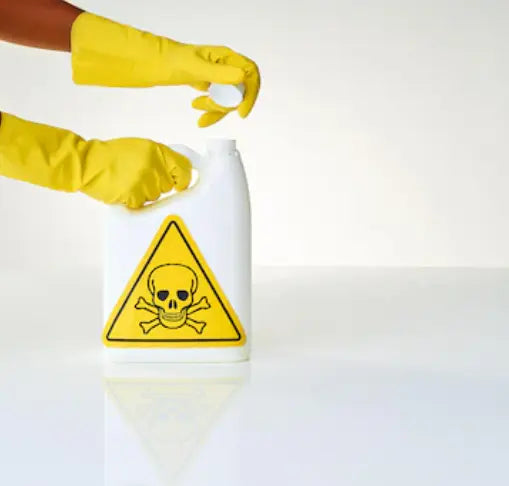The Dirty Truth: Harmful Chemicals Lurking in Your Dishwashing Liquid
Did you know that your favorite dishwashing liquid could be hiding some dirty secrets? Harmful chemicals such as phosphates, ammonia, and chlorine are commonly used in many dishwashing liquids to help cut through grease and grime. However, these chemicals can also have negative effects on your health and the environment. From skin irritation to water pollution, the consequences of using these products can be far-reaching. Fortunately, there are safer alternatives available that can still get the job done without the risks. In this article, we'll take a closer look at the dirty truth behind the chemicals lurking in your dishwashing liquid and explore some eco-friendly and toxin-free options that will keep your dishes sparkling clean and your conscience clear.
The problem with traditional dishwashing liquids
When it comes to cleaning dishes, many people rely on traditional dishwashing liquids to get the job done. These products are convenient, widely available, and often affordable. However, they also come with some downsides. One of the biggest issues with traditional dishwashing liquids is the use of harmful chemicals. Phosphates, for example, are commonly used to help break down grease and food particles. While they are effective at this task, they can also contribute to water pollution when they enter our lakes, rivers, and oceans. In addition, phosphates can promote the growth of harmful algae blooms, which can harm fish and other aquatic life.
Another chemical commonly found in dishwashing liquids is ammonia. This ingredient can help to cut through grease and grime, but it can also be dangerous if ingested or inhaled. Ammonia can cause irritation to the eyes, nose, and throat, and prolonged exposure can lead to respiratory problems. Chlorine is another ingredient that is often used in dishwashing liquids. While it can help to disinfect surfaces and kill bacteria, it can also be harmful if ingested or inhaled. Chlorine gas can be particularly dangerous, and it can cause coughing, shortness of breath, and chest pain.
In addition to these health and environmental concerns, traditional dishwashing liquids can also be harsh on your hands. The chemicals used in these products can strip your skin of its natural oils, leaving it dry and irritated. This can be especially problematic for people with sensitive skin or those who wash dishes frequently.
Harmful chemicals commonly found in dishwashing liquids
Now that we've covered some of the problems with traditional dishwashing liquids, let's take a closer look at some of the harmful chemicals that are commonly found in these products.
### Phosphates
Phosphates are a type of salt that are often added to dishwashing liquids to help break down grease and food particles. While they can be effective at this task, they can also have negative effects on the environment. When phosphates enter our waterways, they can promote the growth of harmful algae blooms. These blooms can deplete oxygen levels in the water, which can harm fish and other aquatic life. In addition, phosphates can contribute to water pollution and make it harder for water treatment plants to purify our drinking water.
### Ammonia
Ammonia is a colorless gas that is often used in cleaning products, including dishwashing liquids. It can help to cut through grease and grime, but it can also be dangerous if ingested or inhaled. Ammonia can irritate the eyes, nose, and throat, and prolonged exposure can lead to respiratory problems. In addition, ammonia can be harmful to the environment when it enters the air or water.
### Chlorine
Chlorine is a chemical element that is often used to disinfect surfaces and kill bacteria. It is also commonly found in dishwashing liquids. While chlorine can be effective at these tasks, it can also be harmful if ingested or inhaled. Chlorine gas can cause coughing, shortness of breath, and chest pain. In addition, chlorine can react with other chemicals in the environment to form harmful byproducts, such as trihalomethanes.
The impact of these chemicals on your health and the environment
The harmful chemicals found in traditional dishwashing liquids can have negative effects on both your health and the environment. Let's take a closer look at some of the impacts of these chemicals.
### Health impacts
The chemicals found in dishwashing liquids can be harmful if ingested or inhaled. Ammonia and chlorine, for example, can cause respiratory problems and irritation to the eyes, nose, and throat. Prolonged exposure to these chemicals can also lead to more serious health issues. In addition, the harsh chemicals in dishwashing liquids can strip your skin of its natural oils, leading to dryness and irritation.
### Environmental impacts
When phosphates, ammonia, and chlorine enter our waterways, they can have negative effects on the environment. Phosphates can promote the growth of harmful algae blooms, which can deplete oxygen levels in the water and harm fish and other aquatic life. Ammonia and chlorine can be harmful to aquatic life as well, and they can contribute to water pollution. In addition, the production and disposal of these chemicals can have a negative impact on the environment, contributing to greenhouse gas emissions and other forms of pollution.
Safer alternatives to traditional dishwashing liquids
Fortunately, there are safer alternatives to traditional dishwashing liquids that can still get the job done without the risks. Here are a few options to consider:
### Natural dishwashing liquids
There are many natural dishwashing liquids available on the market that are free from harmful chemicals. These products are often made with plant-based ingredients, such as coconut oil and aloe vera, and they can still effectively clean your dishes. Look for products that are labeled as "natural" or "eco-friendly" to ensure that you're getting a safer option.
### DIY dishwashing liquids
If you're feeling adventurous, you can also try making your own dishwashing liquid at home. There are many recipes available online that use simple, natural ingredients such as castile soap, vinegar, and essential oils. Making your own dishwashing liquid can be a fun and rewarding project, and it can also help you avoid the harmful chemicals found in traditional products.
### Soap nuts
Another natural option for washing dishes is soap nuts. These are the dried shells of the soapberry plant, and they contain natural saponins that can help to clean your dishes. Simply place a few soap nuts in a cloth bag and add them to your dishwasher or sink. They can be used for multiple washes before they need to be replaced.
How to read ingredient labels on dishwashing liquids
When shopping for dishwashing liquids, it's important to know how to read ingredient labels to ensure that you're getting a safer, more eco-friendly option. Here are a few things to look for:
### Avoid phosphates
One of the biggest culprits when it comes to harmful chemicals in dishwashing liquids is phosphates. Look for products that are labeled as "phosphate-free" to ensure that you're not contributing to water pollution.
### Avoid ammonia and chlorine
It's also important to avoid dishwashing liquids that contain ammonia and chlorine. Look for products that use natural ingredients instead.
### Look for natural ingredients
When shopping for dishwashing liquids, look for products that use natural ingredients such as coconut oil, aloe vera, and essential oils. These ingredients are safer for both your health and the environment.
DIY dishwashing liquid recipes
If you're interested in making your own dishwashing liquid at home, here are a few recipes to try:
### Recipe 1: Lemon and Baking Soda Dishwashing Liquid:
- 2 cups of hot water
- 1/4 cup of grated bar soap
- 2 tablespoons of lemon juice
- 2 tablespoons of baking soda
Dissolve the grated bar soap in hot water and add lemon juice and baking soda. Stir well until all the ingredients are thoroughly mixed. Pour the mixture into a bottle and use it as a dishwashing liquid.
### Recipe 2: DIY soap nuts dishwashing liquid
- 6-8 soap nuts
- 6 cups water
- 1/4 cup white vinegar
- 10 drops essential oil (optional)
Place soap nuts in a large pot with water. Bring to a boil, then reduce heat and simmer for 30 minutes. Remove from heat and allow to cool. Strain the liquid into a bottle, then add vinegar and essential oil. Use as you would any other dishwashing liquid.
Best eco-friendly dishwashing liquids
If you're looking for a safer, more eco-friendly dishwashing liquid, here are a few options to consider:
### awenest plant based dishwash concentrate
It is made using 100% PLANT-BASED ingredients, making it a healthy and eco-friendly choice. awenest dishwash concentrate is packaged in a GLASS BOTTLE, ensuring that it doesn't contribute to plastic waste.
### Rustic Art dish wash concentrate
It is a perfectly formulated blend to clean those harsh stains, greases, bacteria while keeping those precious, hardworking hands soft and safe! lemon and tamarind adds shine, removes harsh burns and sticky grease.
### Jaevindia citrus bio- enzyme
We have a natural solution for your home and family's needs. This natural product can be used in your home and it does not damage the environment.
Conclusion: Making the switch to safer dishwashing liquids
In conclusion, the harmful chemicals found in traditional dishwashing liquids can have negative effects on both your health and the environment. Fortunately, there are safer alternatives available that can still get the job done without the risks. Whether you opt for natural dishwashing liquids, DIY recipes, or eco-friendly options, making the switch to safer dishwashing liquids is a small but important step that can have a big impact on your health and the health of the planet. So next time you're washing dishes, think twice about what's in your dishwashing liquid, and consider making the switch to a safer, more eco-friendly option.
Author
Brinda shah is a freelance content writer. she is a ca turned into a writer who loves to read, write & meditate. you can connect with her on linkedin and on instagram






